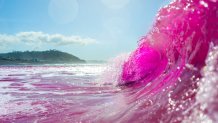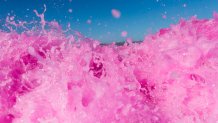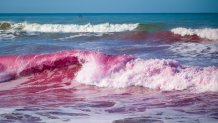Scientists from the Scripps Institution of Oceanography made a splash Friday, turning part of a North County, San Diego lagoon and the adjoining ocean pink in an effort to better understand how freshwater interacts with the surf zone.
The scientists released 15 gallons of pink dye, which is nontoxic, into the Los Peñasquitos Lagoon at Torrey Pines State Beach in Southern California shortly after 9 a.m. and didn't have long to wait to watch the plume drift under the coast road and soon had the waves blushing. The dye is released during an ebb tide, when levels are falling, near the mouth of the estuary.
"The bright pink fluorescent dye occupies a very different range of wavelengths on the visible light spectrum than the background ocean water, making it straightforward to detect both with our eyes, with underwater sensors, and from above with optical cameras," Scripps said in a news release sent out Thursday.
Get top local stories in San Diego delivered to you every morning. Sign up for NBC San Diego's News Headlines newsletter.
While people could still detect the dye in the water for several hours after its release, scientists can detect it for a full 24 hours.
Scripps hopes to "better understand the fate of freshwater and land-derived materials from small plumes as they enter the coastal ocean and the surf zone. The improved understanding of this mixing in the coastal ocean is crucial to quantifying the spreading of sediment, pollutants, larvae, harmful algal blooms and other important material near the coast where many people live and recreate."
More News From San Diego's Coast
Oh, and did we mention how cool looking it is? Peep the video above for rose-colored waterworks.
The dye was released on Jan. 20 and more will be released in late January and early February, according to the Scripps Institution.






